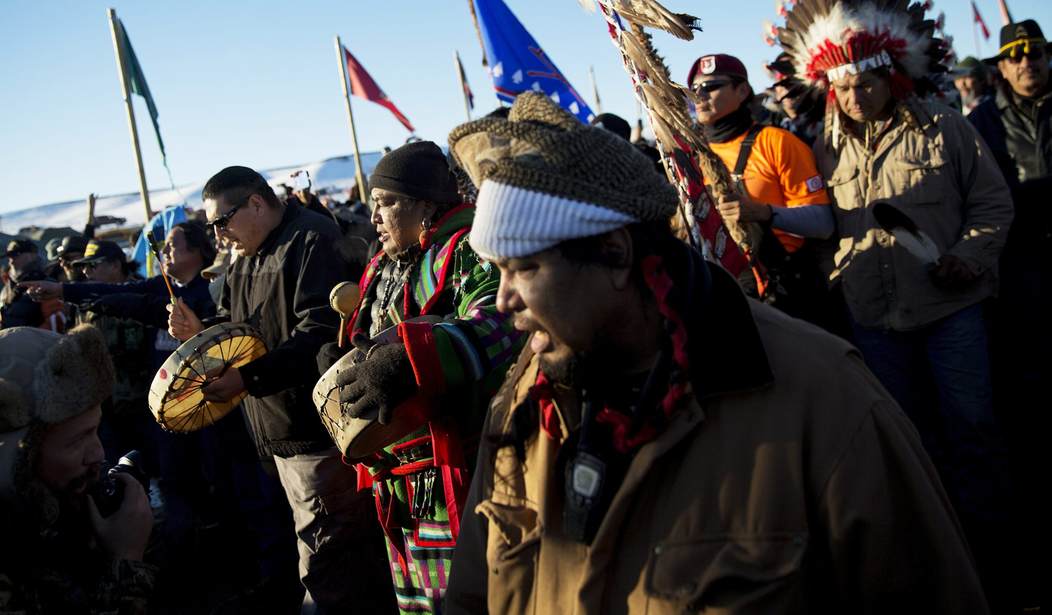After several months of protests led by the Standing Rock Sioux, the Army announced today that it will not approve an easement to let construction of the 1,172-mile Dakota Access Pipeline proceed along its planned route.
In a statement, Assistant Army Secretary for Civil Works Jo-Ellen Darcy said alternate routes needed to be explored. Members of the tribe argue that the pipeline, which would carry nearly half a million barrels a day from the Bakken and Three Forks oil fields to a crude terminal near near Pakota, Ill., would damage sacred Native American sites and pollute their water.
The tribe’s reservation boundary is half a mile south of the proposed crossing under Lake Oahe, an Army Corps of Engineers project on the Missouri River in North Dakota.
“Although we have had continuing discussion and exchanges of new information with the Standing Rock Sioux and Dakota Access, it’s clear that there’s more work to do,” Darcy said. “The best way to complete that work responsibly and expeditiously is to explore alternate routes for the pipeline crossing.”
Alternate routes would be considered with full public input and analysis and an Environmental Impact Statement, she said.
The protests drew celebrities and heated clashes with law enforcement.
“We wholeheartedly support the decision of the administration and commend with the utmost gratitude the courage it took on the part of President Obama, the Army Corps, the Department of Justice and the Department of the Interior to take steps to correct the course of history and to do the right thing,” Standing Rock Sioux Tribal Chairman Dave Archambault II said in a statement today. “The Standing Rock Sioux Tribe and all of Indian Country will be forever grateful to the Obama Administration for this historic decision.”
“We want to thank everyone who played a role in advocating for this cause. We thank the tribal youth who initiated this movement. We thank the millions of people around the globe who expressed support for our cause. We thank the thousands of people who came to the camps to support us, and the tens of thousands who donated time, talent, and money to our efforts to stand against this pipeline in the name of protecting our water. We especially thank all of the other tribal nations and jurisdictions who stood in solidarity with us, and we stand ready to stand with you if and when your people are in need,” he added.
Archambault said the tribe will respond to the decision in a “peaceful and prayerful manner” and “look forward to being able to return home and spend the winter with our families and loved ones.”
He added that the tribe hope the Trump administration will “respect this decision and understand the complex process that led us to this point.”
“When it comes to infrastructure development in Indian Country and with respect to treaty lands, we must strive to work together to reach decisions that reflect the multifaceted considerations of tribes,” the chairman continued. “Treaties are paramount law and must be respected, and we welcome dialogue on how to continue to honor that moving forward. We are not opposed to energy independence, economic development, or national security concerns but we must ensure that these decisions are made with the considerations of our Indigenous peoples.”
Archambault said he also hopes for a relationship with local law enforcement based on “mutual understanding and respect.”
Sen. John Hoeven (R-N.D.) charged that the administration violated the law and simply kicked the issue to the next administration, “which has already indicated it will approve the easement, and in the meantime perpetuates a difficult situation for North Dakotans.”
“Protesters should move from their unlawful site now that the Obama administration has made its decision. By staying on the site, the protesters subject residents in the area to additional weeks of disruption and hardship,” Hoeven said.
“The reality is that the company has observed all proper procedures and met all environmental standards required by four states and the Corps itself. Further, refusing the easement has ramifications over the long term; if companies and individuals cannot rely on a system that follows the rule of law, nobody will risk making future investments in our country’s vital infrastructure. That will make our nation vulnerable and less secure.”
Hoeven added that it’s “incumbent on the administration to provide funding and law enforcement resources to help maintain public safety.”
Tribes have expressed concerns about how President-elect Trump will approach tribal sovereignty. In 1993, he filed a federal lawsuit claiming that allowing Indian casinos on sovereign tribal land gives an advantage to “a very limited class of citizens,” referring to Native Americans. In a congressional hearing that year, Trump said “rampant” organized crime on reservations was shaping up to be “the biggest scandal ever,” and stressed that “an Indian casino operation in northern New Jersey would be the economic death knell to Atlantic City.”
A congressional supporter of the pipeline protesters, Sen. Bernie Sanders (I-Vt.), said that “in the year 2016, we should not continue to trample on Native American sovereignty.”
“We should not endanger the water supply of millions of people. We should not become more dependent on fossil fuel and accelerate the planetary crisis of climate change,” Sanders said. “Our job now is to transform our energy system away from fossil fuels, not to produce more greenhouse gas emissions.”









Join the conversation as a VIP Member